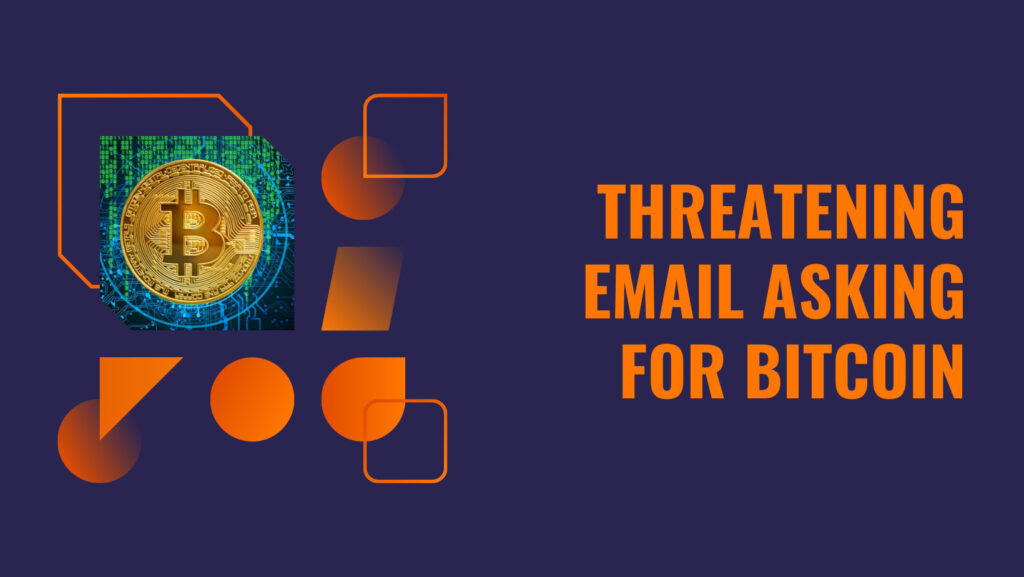
threatening email asking for bitcoin
Threatening Email Asking For Bitcoin
In recent years threatening Email Asking for Bitcoin, a widespread scam involving threatening emails demanding Bitcoin payments has emerged. These emails typically prey on individuals’ fears by claiming to have compromising information and threatening to release it unless a ransom is paid. This guide aims to shed light on this scam, explain its tactics, and provide actionable steps to protect yourself and take appropriate measures if you receive such an email.
Understanding: Threatening Email Asking For Bitcoin:
- Tactics and Claims: Threatening emails often claim to have obtained sensitive information or evidence of illicit activities, aiming to instill fear and compel victims to comply with their demands.
- Mass-Spam Campaigns: Scammers send these emails in bulk, targeting a large number of individuals in the hopes that some recipients will fall for the scam due to the fear and urgency created.
- Bitcoin Payment: The scammers demand payment in Bitcoin, a digital currency known for its anonymity, making it harder to trace the funds and identify the perpetrators.
Recognizing a Threatening Email:
- Unverified Claims: Be skeptical of unsolicited emails making threats and demanding payment. Remember that scammers often use scare tactics to exploit victims’ emotions.
- Poor Grammar and Spelling: Many threatening emails exhibit grammatical errors, misspellings, or awkward language, which can be a sign of a scam.
- Generic Information: Scammers usually lack specific details about their claims, relying on vagueness to target a wider audience.

Taking Action and Protecting Yourself
Taking Action and Protecting Yourself
- Do Not Respond: Avoid engaging with the scammer. Responding or negotiating can validate their claims and lead to further exploitation.
- Preserve Evidence: Save the threatening email, including headers, and any relevant information. This evidence may be useful if you decide to report the scam to the authorities.
- Report to Law Enforcement: Inform your local law enforcement agency or cybercrime unit about the threatening email. Provide them with all the details and evidence you have gathered.
- Strengthen Online Security: Review your online security measures. Use strong, unique passwords, enable two-factor authentication, and keep your software and antivirus programs up to date.
- Educate Yourself: Stay informed about common online scams, such as threatening emails, and share this knowledge with family and friends to help protect them from falling victim to such scams.
Spread Awareness and Report the Scam
- Inform Others: Raise awareness about the threatening email scam by sharing your experience with family, friends, and colleagues. The more people are aware of these scams, the less likely they are to fall for them.
- Report to Authorities: Contact your local law enforcement agency or the appropriate cybercrime reporting platform in your country. Provide them with all the relevant information and evidence you have collected.
Be Vigilant and Stay Updated
- Stay Alert: Remain vigilant and skeptical of unsolicited emails or communications demanding payments or sensitive information.
- Keep Updated: Stay informed about the latest scams and online threats by following reputable sources, such as government agencies or cybersecurity organizations.
Conclusion:
Threatening emails demanding Bitcoin payments can be distressing, but by understanding their tactics and taking proactive steps, you can protect yourself from falling victim to these scams. Remember to stay cautious, report the scam to the appropriate authorities, and educate others to prevent further victimization. By working together, we can create a safer online environment and help others avoid the harmful impact of these threatening email scams.
Has your peace of mind been disturbed by a threatening email asking for Bitcoin? Or perhaps you’ve become the target of a sextortion email scam? No one should have to face these cyber threats alone. Take a stand and arm yourself with the right knowledge by exploring our comprehensive guide on “How to Handle Threatening Bitcoin and Sextortion Email Scams“. It’s time to regain control over your digital security. Don’t be a victim, be prepared! Click here to learn more today.



